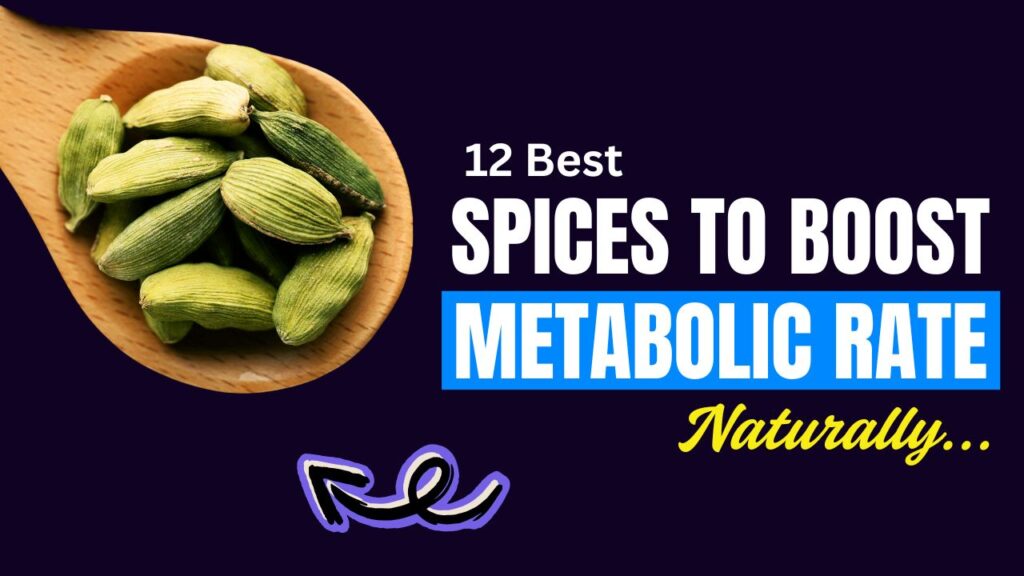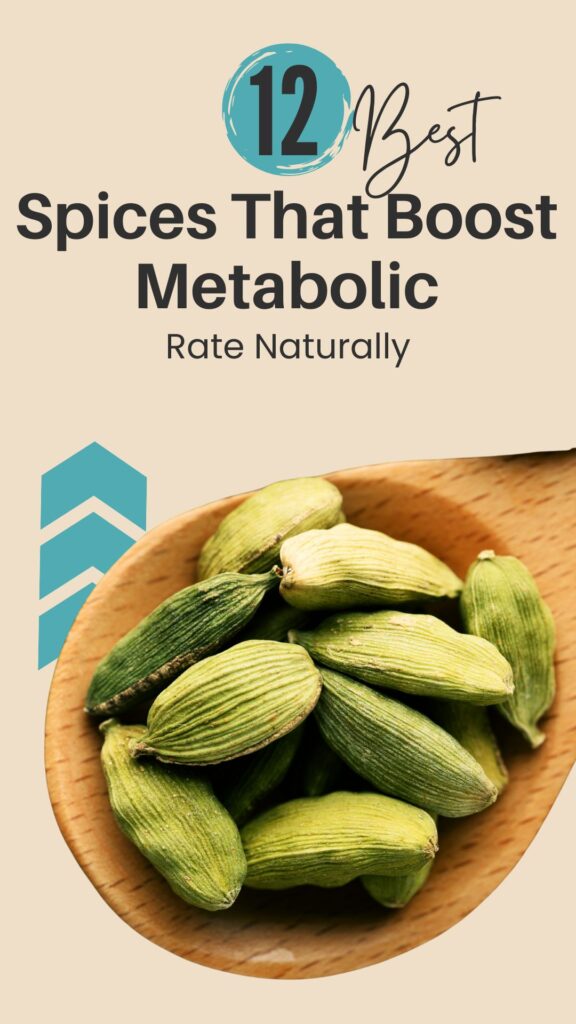Some links in this blog are affiliate links. If you make a purchase through these links, I may receive a small commission. This helps support the site at no extra cost to you.
Did you know that some of the everyday spices in your kitchen can secretly help your body burn more calories—even when you’re at rest?
For centuries, cultures around the world have used spices not just to flavor food but also to heal, energize, and boost vitality.
Modern science now confirms what our ancestors always believed: certain spices naturally enhance your metabolic rate, making it easier for your body to use energy efficiently.
If you often feel sluggish, struggle with stubborn weight, or wish you had more energy throughout the day, these spices might just be the hidden key.
By incorporating them into your meals, teas, or snacks, you can gently nudge your metabolism to work faster without relying on extreme diets or harmful supplements.
In this article, we’ll explore 12 powerful spices that can:
- Support calorie burning and fat metabolism
- Improve digestion and nutrient absorption
- Provide antioxidants and anti-inflammatory benefits
- Offer simple ways to add them to everyday meals
Let’s dive into the world of spices that do more than just add flavor—they fuel your body from the inside out.

Table of Contents

12 Spices To Boost Metabolic
1. Cinnamon
Cinnamon is more than a sweet flavor for desserts—it’s a metabolic powerhouse. Packed with antioxidants, it stabilizes blood sugar levels and reduces cravings, which can prevent overeating.
Best Ways to Eat or Use It
- Sprinkle on oatmeal, yogurt, or smoothies
- Add to coffee or tea for a warming twist
- Use in curries, soups, or baked goods
Who Should Eat / Avoid
Good for: Those managing blood sugar, weight-loss seekers, people with sweet cravings.
Avoid if: You have liver issues or allergies to cassia cinnamon (opt for Ceylon cinnamon instead).
Storage & Buying Tips
- Buy Ceylon cinnamon (“true cinnamon”) for better quality and safety
- Store in airtight containers away from light and heat
Do’s & Don’ts
| ✅ Do | ❌ Don’t |
|---|---|
| Use in moderation daily | Overconsume cassia cinnamon (high coumarin content) |
| Combine with protein-rich meals | Store near moisture |
Possible Side Effects
Excessive cassia cinnamon can harm the liver due to coumarin content.
2. Ginger
This fiery root has been used for centuries in Ayurvedic and Chinese medicine. Ginger boosts thermogenesis (heat production in the body), which supports calorie burning.
Best Ways to Eat or Use It
- Brew ginger tea
- Grate into stir-fries, soups, or marinades
- Blend fresh ginger in smoothies
Who Should Eat / Avoid
Good for: Athletes, people with digestive issues, individuals fighting inflammation.
Avoid if: You’re on blood-thinning medications or prone to acid reflux.
Storage & Buying Tips
- Choose fresh ginger with smooth skin and a firm texture
- Store in the refrigerator or freezer to extend shelf life
Do’s & Don’ts
| ✅ Do | ❌ Don’t |
|---|---|
| Use fresh for maximum potency | Overconsume if prone to heartburn |
| Add to hot water with lemon | Leave it unrefrigerated for too long |
Possible Side Effects
Excess ginger may cause stomach upset or interact with blood-thinning drugs.
3. Turmeric
Known as the “golden spice,” turmeric contains curcumin, which has powerful anti-inflammatory properties and aids fat metabolism.
Best Ways to Eat or Use It
- Add to curries, soups, or rice
- Mix into golden milk with warm milk and black pepper
- Sprinkle into scrambled eggs or roasted vegetables
Who Should Eat / Avoid
Good for: People with joint pain, those seeking fat-loss support, immunity boosters.
Avoid if: You’re on blood-thinners or gallbladder medication.
Storage & Buying Tips
- Buy organic turmeric powder or fresh root
- Always pair with black pepper for better absorption
Do’s & Don’ts
| ✅ Do | ❌ Don’t |
|---|---|
| Pair with black pepper | Store in damp containers |
| Use fresh or ground | Consume excessively if on medication |
Possible Side Effects
Large doses may cause nausea or interact with certain medications.
4. Black Pepper
Often called the “king of spices,” black pepper contains piperine, which enhances metabolism and improves nutrient absorption.
Best Ways to Eat or Use It
- Sprinkle freshly ground pepper on salads, soups, and eggs
- Combine with turmeric for maximum absorption
- Use in marinades and sauces
Who Should Eat / Avoid
Good for: People wanting better digestion and metabolism.
Avoid if: You suffer from stomach ulcers or severe acid reflux.
Storage & Buying Tips
- Buy whole peppercorns and grind fresh
- Store in airtight jars away from sunlight
Do’s & Don’ts
| ✅ Do | ❌ Don’t |
|---|---|
| Use fresh ground pepper | Store ground pepper for too long |
| Pair with turmeric | Overuse if you have ulcers |
Possible Side Effects
Too much black pepper may irritate the stomach.
5. Cayenne Pepper
Cayenne pepper contains capsaicin, which generates heat and promotes fat oxidation, helping your body burn calories efficiently.
Best Ways to Eat or Use It
- Add to soups, stews, and curries
- Sprinkle a small amount on roasted vegetables
- Blend into sauces and dips
Who Should Eat / Avoid
Good for: Weight-loss seekers, people with sluggish metabolism.
Avoid if: You suffer from IBS, stomach ulcers, or acid reflux.
Storage & Buying Tips
- Choose bright red powder without clumps
- Store in airtight glass jars
Do’s & Don’ts
| ✅ Do | ❌ Don’t |
|---|---|
| Start with small amounts | Overconsume—it may irritate stomach |
| Use in spicy dishes for flavor | Leave exposed to air/moisture |
Possible Side Effects
Excessive use can cause stomach discomfort or burning sensations.
6. Cardamom
Cardamom, known as the “queen of spices,” improves digestion and metabolic rate while adding a sweet aroma to foods.
Best Ways to Eat or Use It
- Add to teas, coffees, and desserts
- Use in curries and stews
- Crush pods into rice dishes
Who Should Eat / Avoid
Good for: Digestion, detoxification, and people looking for mild metabolism support.
Avoid if: Allergic or have gallstone issues.
Storage & Buying Tips
- Buy whole pods for longer freshness
- Store in airtight jars in cool, dry places
Do’s & Don’ts
| ✅ Do | ❌ Don’t |
|---|---|
| Use whole pods for flavor | Buy powdered cardamom (loses aroma quickly) |
| Store properly sealed | Expose to heat |
Possible Side Effects
Overuse can cause mild digestive issues in sensitive people.
7. Cloves
Cloves are rich in antioxidants and aid in increasing metabolism by stimulating digestive enzymes.
Best Ways to Eat or Use It
- Add to teas, curries, and rice dishes
- Use ground cloves in baking
- Infuse in hot drinks during winter
Who Should Eat / Avoid
Good for: People with digestive issues or seeking immune support.
Avoid if: You’re on blood-thinners or have bleeding disorders.
Storage & Buying Tips
- Buy whole cloves for longer shelf life
- Store in airtight containers
Do’s & Don’ts
| ✅ Do | ❌ Don’t |
|---|---|
| Use sparingly for flavor | Overuse in food—can be overpowering |
| Grind fresh when needed | Store in plastic bags |
Possible Side Effects
High amounts can thin the blood.
8. Mustard Seeds
These tiny seeds pack a punch with compounds that enhance thermogenesis and fat metabolism.
Best Ways to Eat or Use It
- Use in pickles, curries, and stir-fries
- Sprinkle in salad dressings
- Blend into sauces and dips
Who Should Eat / Avoid
Good for: People seeking fat-burning and digestion support.
Avoid if: You have thyroid issues or seed allergies.
Storage & Buying Tips
- Buy whole mustard seeds for freshness
- Store in glass jars away from sunlight
Do’s & Don’ts
| ✅ Do | ❌ Don’t |
|---|---|
| Roast before adding to dishes | Store ground seeds for too long |
| Use sparingly | Expose to moisture |
Possible Side Effects
Overconsumption can cause stomach irritation.
9. Fennel Seeds
Traditionally chewed after meals, fennel seeds support digestion and mildly boost metabolism.
Best Ways to Eat or Use It
- Chew raw after meals
- Brew fennel tea
- Use in curries, soups, and bread
Who Should Eat / Avoid
Good for: Digestion, bloating relief, mild metabolic boost.
Avoid if: Pregnant women in excess, or those with allergies.
Storage & Buying Tips
- Buy whole seeds for freshness
- Store in airtight containers away from sunlight
Do’s & Don’ts
| ✅ Do | ❌ Don’t |
|---|---|
| Roast lightly for flavor | Overconsume during pregnancy |
| Brew as tea | Leave open to moisture |
Possible Side Effects
Excess fennel may affect hormonal balance in sensitive individuals.
10. Cumin
Cumin seeds help improve digestion, nutrient absorption, and fat metabolism.
Best Ways to Eat or Use It
- Add to curries, soups, and rice dishes
- Use roasted ground cumin in salads
- Brew cumin tea (jeera water)
Who Should Eat / Avoid
Good for: Weight management, digestion, immunity support.
Avoid if: You’re on heavy medication or prone to low blood sugar.
Storage & Buying Tips
- Buy whole seeds and roast before grinding
- Store in airtight jars
Do’s & Don’ts
| ✅ Do | ❌ Don’t |
|---|---|
| Roast seeds for aroma | Store in plastic bags |
| Brew cumin water for daily use | Overconsume if prone to acidity |
Possible Side Effects
High amounts can lower blood sugar excessively.
11. Nutmeg
Nutmeg stimulates digestion and helps with fat metabolism when consumed in moderation.
Best Ways to Eat or Use It
- Sprinkle in warm milk
- Add to baked goods, curries, and soups
- Use in spice blends
Who Should Eat / Avoid
Good for: Digestion and mild metabolism support.
Avoid if: Consumed in high doses—it can be toxic.
Storage & Buying Tips
- Buy whole nutmeg and grate fresh
- Store in a cool, dark place
Do’s & Don’ts
| ✅ Do | ❌ Don’t |
|---|---|
| Use in small amounts | Overconsume—it can be harmful |
| Grate fresh | Store in humid conditions |
Possible Side Effects
Large amounts can cause hallucinations or nausea.
12. Fenugreek
Fenugreek seeds help regulate blood sugar and support fat metabolism.
Best Ways to Eat or Use It
- Soak seeds overnight and drink the water
- Add to curries, breads, and stir-fries
- Use in powdered form in spice blends
Who Should Eat / Avoid
Good for: Blood sugar management, digestion, metabolism.
Avoid if: Pregnant women in large amounts, or those with allergies.
Storage & Buying Tips
- Buy whole seeds for freshness
- Store in airtight containers away from light
Do’s & Don’ts
| ✅ Do | ❌ Don’t |
|---|---|
| Soak overnight for best results | Overconsume raw—it’s bitter |
| Use in moderation | Leave exposed to moisture |
Possible Side Effects
High intake may cause digestive discomfort.
Conclusion
Spices are more than kitchen essentials—they’re nature’s secret way of helping you stay energized, support digestion, and burn calories more efficiently. From the fiery heat of cayenne to the soothing aroma of cardamom, each of these 12 spices offers unique metabolic benefits when used wisely.
The best part? You don’t need to overhaul your diet—just start sprinkling these spices into your daily meals, teas, or snacks. Small, consistent changes can add up to a noticeable difference in your energy and overall health.
So, which of these metabolism-boosting spices will you try first? Share your favorite spice-infused recipe in the comments below and inspire others to spice up their health journey naturally.
Frequently Asked Questions (FAQs)
Do spices really boost metabolism?
Yes, certain spices contain bioactive compounds that can slightly increase thermogenesis (heat production in the body) and improve fat metabolism. While they’re not a magic weight-loss solution, they can support a healthy diet and active lifestyle.
Which spice is best for speeding up metabolism?
Cayenne pepper and ginger are among the most effective for boosting metabolic rate because of their thermogenic properties. However, combining different spices can offer more balanced benefits.
How much spice should I consume daily for metabolism benefits?
Moderation is key. Typically, ½ to 1 teaspoon of ground spices like cinnamon, cumin, or turmeric daily can be beneficial. For stronger spices like cayenne or cloves, smaller amounts are sufficient.
Can I take spices in supplement form instead of food?
Yes, some spices like turmeric (curcumin), ginger, or cinnamon are available as supplements. However, it’s always better to get them naturally from food unless prescribed by a healthcare professional.
Are there any side effects of eating too many spices?
Overconsumption may cause stomach irritation, heartburn, or interact with certain medications. For example, too much cinnamon may affect the liver, and excess nutmeg can be toxic.
Can pregnant women use metabolism-boosting spices?
Pregnant women can enjoy mild amounts of spices like turmeric, fennel, or cumin, but should avoid excessive intake of fenugreek, nutmeg, or strong chili-based spices. Always consult a doctor before making changes.
Do spices help with weight loss?
Spices can aid weight loss indirectly by boosting metabolism, improving digestion, and reducing cravings. But they should be combined with a balanced diet and exercise for noticeable results.
How should I store spices to keep them fresh and potent?
Store whole spices in airtight glass containers, away from heat, moisture, and direct sunlight. Whole spices last longer than ground ones.
Can children eat these metabolism-boosting spices?
Yes, but in small, age-appropriate amounts. Avoid very spicy options like cayenne for young children, as their digestive systems may be sensitive.
How long does it take to see results from eating these spices?
Results vary, but with regular use alongside a healthy lifestyle, many people notice improvements in digestion, energy, and appetite control within a few weeks.










